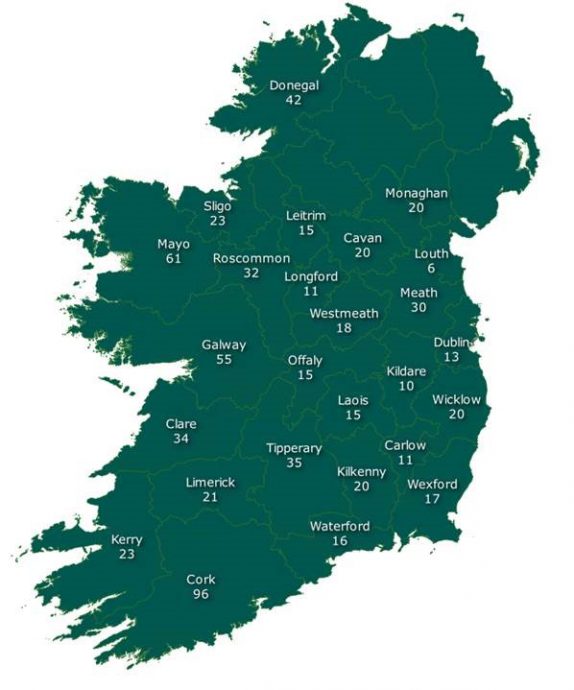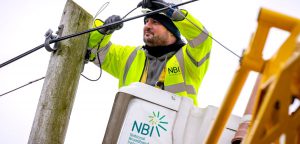First 25 schools now connected under National Broadband Plan
679 schools will be connected to broadband by the end of 2022 in an acceleration of the National Broadband Plan (NBP) announced today by the Government and NBI. Under the originally-planned rollout, some schools would have had to wait up to seven years for connection. Now, all schools will be connected within two years.
Some 70 schools across the country in the Intervention Area will become Broadband Connection Points (BCPs), by the end of Q1 2021, receiving 150mb high-speed connectivity for educational access. The first 25 schools have already been connected, incuding Achonry National School in Sligo; St. Joseph’s National School in Laois; St. Kevin’s National School in Co. Wicklow; St Joseph’s National School in Galway; Ballagh National School in Roscommon; Ennistymon National School in Clare; Calry National School in Sligo and Balscadden National School in Dublin.
Broadband Connection Points (BCPs) delivered under the NBP will ensure that primary school pupils in rural Ireland will be able to participate fully in the digital revolution that is taking place. A BCP at a school location will provide connectivity for pupils and teachers and will underpin the Department of Education’s Digital Learning Framework for Schools.
Speaking about the initiative, the Taoiseach, Mícheál Martin TD said:
“Some 50,000 children in almost 679 primary schools will be connected with high speed broadband by end-2022. This is an investment in education, technology and rural Ireland. The National Broadband Plan will allow all parts of the State to take full advantage of the opportunities that lie ahead. Fast-tracking connectivity for schools is a great first step.”
The Minister for the Environment, Climate and Communications, Eamon Ryan TD, said:
“The National Broadband Plan is a transformative project for rural Ireland, which will see fibre rolled out to every household, school, business and farm in the Intervention Area.
Today’s announcement will give rural primary schools, earlier access to the huge variety of online educational resources which high-speed connectivity can provide.
Through the National Broadband Plan, Ireland will ensure that every school, no matter how rural or remote, has access to world-leading high-speed broadband.”
The Minister for Education, Norma Foley TD, commented:
“I welcome the news that NBI is accelerating its rollout of high speed broadband to primary schools and my Department will continue to work with the Department of Environment, Climate and Communications on this project.Schools to be provided with high speed connectivity as Broadband Connection Points in the first year of the National Broadband Plan, furthers the Government’s implementation of the Digital Strategy for Schools.
“With almost 679 rural primary schools to be connected to high speed broadband through the National Broadband Plan Intervention Area Plan including the BCP Programme, Our aim is that the vast majority of schools in the Schools Broadband Programme will be provided with high speed connectivity by 2023, including those in the NBP Intervention Area to be connected by the end of 2022.”
David McCourt, Chairman at National Broadband Ireland, commented:
“Today is an extremely proud day as we bring high-speed connectivity to schools across the country. Location should never limit opportunities available for students.
Accelerating the rollout of high-speed broadband to every school in the Intervention Area has been a key ambition, and NBI are delighted to make that a reality with today’s announcement. Our teams are working tirelessly across the country and we’re pleased to be making great strides in providing high-speed broadband to schools so that they can enjoy the benefits as soon as possible.”
The BCP initiative is a collaborative effort involving the Department of the Environment, Climate and Communications, the Department of Rural and Community Development, the Department of Education, Local Authorities and the owners and managers of the BCP sites.
There are two types of BCPs – community facilities for public access; and primary schools for educational access. It is expected that 200 public access BCP sites and 70 primary school BCPs will be connected by the end of Q1 2021. A full list of the schools BCPs is available from NBI.
The schools BCP initiative applies to primary schools in the intervention area. The intervention area was determined following a mapping exercise to identify as far as reasonably possible those areas where intervention is required to ensure high speed broadband is available. The Department conducted a public consultation in 2019, seeking submissions from operators who wish to have their existing high-speed broadband networks, or who have developed plans to invest in high-speed broadband networks over the next 7 years, to be included on the Department’s High-Speed Broadband Map.
The High-Speed Broadband Map, shows the areas covered by the State-led intervention as well as those targeted by commercial operators.
National Broadband Plan Acceleration:
County Breakdown of Primary Schools to be connected by the end of 2022




